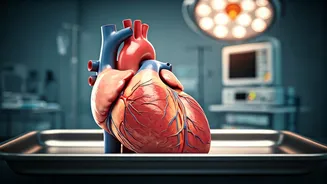Understanding Heart Attacks
Heart attacks, medically termed myocardial infarctions, occur when blood flow to the heart is severely reduced or cut off. This usually happens because
of a buildup of plaque in the coronary arteries. These plaques can rupture, forming a clot that blocks blood flow. Common symptoms include chest pain or discomfort, shortness of breath, nausea, and pain in the arm, jaw, or back. Recognizing these signs and acting quickly is crucial because the longer the heart muscle is deprived of oxygen, the more damage occurs. Treatment often involves medications to dissolve clots, procedures like angioplasty to open blocked arteries, and lifestyle changes to reduce future risks.
Debunking Viral Remedies
Numerous home remedies and viral suggestions circulate online. However, it's critical to approach these with skepticism, as some can be ineffective or even harmful. One prevalent myth involves the immediate consumption of specific foods or drinks to reverse a heart attack, which is not supported by medical evidence. Another common misconception involves using supplements that claim to dissolve clots, but these have not been proven to work and may interfere with actual treatments. It's imperative to consult healthcare professionals and rely on verified medical information instead of unproven remedies. The priority must be prompt medical attention rather than seeking quick fixes online, which could delay vital treatment.
Recognizing Real Symptoms
Identifying heart attack symptoms is essential for swift action. The most typical symptom is chest pain, often described as pressure, squeezing, or a crushing sensation, which can radiate to the arm, jaw, neck, or back. Shortness of breath, nausea, vomiting, cold sweats, and lightheadedness are other significant indicators. Women, in particular, may experience atypical symptoms such as fatigue or indigestion. If you or someone around you shows these symptoms, immediately call emergency services. Provide details of the situation and any known medical history. Do not delay seeking medical help because every moment counts when dealing with a heart attack.
Immediate Actions to Take
When a heart attack is suspected, calling emergency services (such as 112 in IN) is the most critical first step. While waiting for medical assistance, help the person sit down and remain calm. If the person is conscious and has prescribed medication such as nitroglycerin for chest pain, assist them as directed by their doctor. If the person loses consciousness, check for breathing and pulse. If there is no breathing or pulse, begin CPR (cardiopulmonary resuscitation), if you are trained in doing so. This hands-on procedure can help maintain blood flow to vital organs until medical help arrives. Remember that acting quickly significantly increases the chances of survival and recovery.
The Importance of Prevention
Preventing heart attacks involves taking proactive steps to manage risk factors. A healthy lifestyle forms the foundation of prevention, including eating a balanced diet rich in fruits, vegetables, and whole grains while limiting saturated and trans fats, sodium, and added sugars. Regular physical activity is also essential, recommending at least 150 minutes of moderate-intensity or 75 minutes of vigorous-intensity exercise per week. Controlling blood pressure, managing cholesterol levels, and maintaining a healthy weight are also critical. Quitting smoking is one of the most effective steps to reduce heart attack risk. Regular check-ups with your doctor are essential for monitoring your health and managing any emerging risk factors.
When to Seek Help
Prompt medical attention is crucial when heart attack symptoms arise. If you experience chest pain, especially if it's accompanied by other symptoms like shortness of breath, nausea, or pain radiating to the arm, jaw, or back, call emergency services immediately. Do not attempt to drive yourself to the hospital. Emergency responders can provide immediate care and transport you safely. Provide as much detail as possible about your symptoms, medical history, and any medications you are taking. Early intervention can drastically reduce the amount of damage to the heart muscle. Delaying seeking medical help could lead to severe consequences.
























